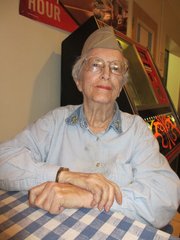World War II veteran Carolyn Fix may have slowed down somewhat as she approaches 90 years old, but she has not lost her sharp wits and her memory of her wartime experiences. She pulls dates and events out of her head quickly and shares anecdotes amusing or a bit sad.
She still attends WAC meetings in Arlington and Christmas parties in Alexandria hosted by her last employer.
At Vienna’s American Legion Post 180, where she holds dual membership in the legion as a war veteran and in the auxiliary, Fix wears her army cap to legion meals and meetings.
She lived a wartime life extraordinary even for her time.
IN 1940, Fix graduated from high school but jobs in her upstate New York hometown were scarce. She took advantage of a government-sponsored education program and learned machinery. Her first job after high school was in a factory making machine guns for the war effort. She was hired as one of the factory’s first four women employees. Simultaneously, she studied X-ray technology at night and when she joined the Women’s Army Corp at 20 years old, she joined the medical corps as an X-ray technician.
In those days, Fix said, you had to be, at least, 20 years old to join a women’s armed forces service. Enlistees under age 21 needed parental signatures. Just shy of 21, her parents approved her enlistment. Her older brother was already in the army.
“I would say that the whole country was involved in the war effort, which we haven’t seen since,” said Fix. Everyone did their share, regardless of age or gender. “Children collected scrap metal from tin cans, metal fences, any metal they could find. There were women working in war plants, we had victory gardens and rationing. We bought war bonds. Everyone pitched in.”
Fix shipped out on Nov. 5, 1943, almost 70 years ago, put on a troop train to somewhere. “They didn’t tell us where we were going,” said Fix. “They just said we were going to ‘God’s country.’” It turned out to be a Northern California army hospital at a base that shipped troops to the Pacific.
“It was a very dangerous place,” said Fix. “People knew where they were headed so they didn’t care what they did.” Evidently, according to Fix’s recollections, the soldiers and airmen committed a lot of crime and violence. The women on base needed protection from the wildness. The airmen, she said, thought they could do anything.
“The female X-ray technicians were resented because they replaced the males who were being shipped overseas,” Fix said.
Want to know why there were no nylon stockings on the east coast during the war? Fix has a response to that. “Because the government bought them up to bribe the sheiks in North Africa. That was a mistake because the harems didn’t wear nylons.”
Adds Fix, “we also needed nylon for parachutes,” which, she concedes, was a big reason for nylon scarcity.
When the war ended, other soldiers returned home. The medical corps, which Fix was with as an X-ray technician, stayed until 1948. After military life, Fix went to college at Utica, getting her bachelor’s degree in biology. At Syracuse, she went on for her master’s degree in geology. While working at the U.S. Geological Survey, Fix took a sabbatical and accepted a Fulbright scholarship, going off to Australia for 10 months in Queensland.
TODAY, FIX LIVES IN VIENNA since moving here in 1978, lucky-enough to live on pensions. In her home lives her best friend, a wire-haired dachshund named Winnie the Pooch, 15-and-a-half years old. He has a ramp to climb up to the bed, Fix says. In her home, she is surrounded by antiques, including a 1907 non-electric vacuum cleaner that no longer works. She even played saxophone with the Vienna Community Band but left when traveling around became too wearisome. Fix has visited 22 countries and recalls her many “wonderful” Med cruises.
Although Fix uses a “walker” to ambulate safely in public spaces, she does not at home. “I just hold on,” she says. She still follows current affairs and when asked what issues are most important to her nowadays, she does not hesitate.
“The economy and our big debt.”
